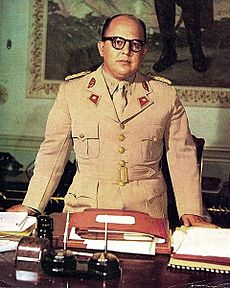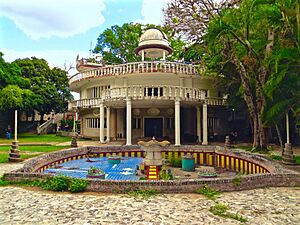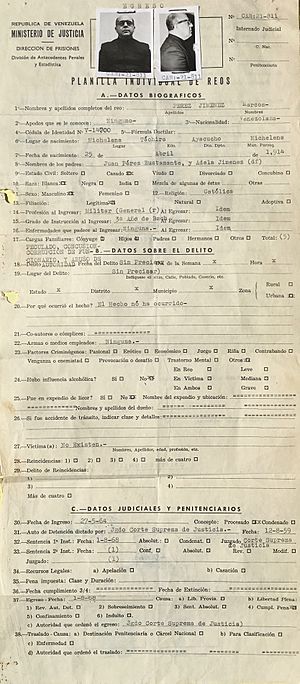Marcos Pérez Jiménez facts for kids
Quick facts for kids
Marcos Pérez Jiménez
|
|
|---|---|
 |
|
| President of Venezuela | |
| In office 2 December 1952 – 23 January 1958 Provisional: 2 December 1952 – 19 April 1953 |
|
| Preceded by | Germán Suárez Flamerich |
| Succeeded by | Wolfgang Larrazábal |
| 30th Commander-in-Chief of the Venezuelan Army | |
| In office November 1948 – August 1954 |
|
| Preceded by | Carlos Delgado Chalbaud |
| Succeeded by | Hugo Fuentes |
| Minister of Defense | |
| In office 18 October 1948 – 1 January 1952 |
|
| Preceded by | Carlos Delgado Chalbaud |
| Succeeded by | Jesús M. Castro León |
| Personal details | |
| Born |
Marcos Evangelista Pérez Jiménez
25 April 1914 Táchira, United States of Venezuela |
| Died | 20 September 2001 (aged 87) Alcobendas, Spain |
| Nationality | Venezuelan |
| Spouse | Flor María Chalbaud |
| Children | 5 daughters (Monica Mercedes with Marita Lorenz) |
| Alma mater | Military academy of Venezuela |
| Occupation | Politician |
| Profession | Military officer |
| Signature | |
| Military service | |
| Allegiance | |
| Branch/service | Venezuelan Army |
| Years of service | 1931–1958 |
| Rank | |
| Battles/wars | none |
Marcos Evangelista Pérez Jiménez (born April 25, 1914 – died September 20, 2001) was a Venezuelan military officer and general. He was a powerful leader of Venezuela from 1950 to 1958. He first ruled as part of a military group called a junta from 1950 to 1952. Then, he became president from 1952 to 1958.
Pérez Jiménez was involved in a coup (a sudden takeover of the government) in 1948. This made him part of the ruling junta. In 1952, there was an election, but the junta stopped counting votes when it looked like the opposition was winning. They then declared Pérez Jiménez the provisional president.
He became the official president in 1953. He put a new constitution in place that gave him almost complete power. During his time, Venezuela's economy grew quickly. High oil prices helped fund many public works projects. These included new roads, bridges, government buildings, and homes. Industries like hydroelectricity, mining, and steel also grew fast.
However, Pérez Jiménez's government was very strict. His secret police, called the Dirección de Seguridad Nacional, stopped people from criticizing him. They put those who disagreed with his rule in prison.
In January 1958, many people protested for democratic changes. Pérez Jiménez was removed from power by a military coup. He then went into exile, first to the Dominican Republic, then to Miami in the United States, and finally settled in Spain.
Contents
Early Life and Military Career
Marcos Evangelista Pérez Jiménez was born in Michelena, Táchira State, Venezuela. His father, Juan Pérez Bustamante, was a farmer. His mother, Adela Jiménez, was a schoolteacher from Colombia.
Pérez Jiménez went to school in his hometown and in Colombia. In 1934, he finished at the Military academy of Venezuela. He was the best student in his class. He later studied at a military school in Peru.
In 1945, Pérez Jiménez helped in a coup that brought Rómulo Betancourt to power. Betancourt was the founder of the Democratic Action party. This government was known as El Trienio Adeco. After some changes, elections were held in 1947. Romulo Gallegos, a member of Betancourt's party, was elected president.
The 1948 Coup and Junta Rule
Soldiers were worried about their pay and old army equipment. Because of this, Pérez Jiménez and Carlos Delgado Chalbaud led another coup in 1948. This removed Betancourt and Gallegos from power.
Political parties were banned, and the Communist Party was again outlawed. A military group, or junta, led by Delgado Chalbaud, Luis Felipe Llovera Páez, and Pérez Jiménez, took control.
Later, Delgado Chalbaud was murdered. The military junta then became a "Government Junta." Pérez Jiménez became the main power behind the new provisional president, Germán Suárez Flamerich.
Presidency and National Development
The ruling junta announced an election for 1952. The goal was to choose a new assembly that would pick a president and write a new constitution. When early results showed the opposition winning, the junta stopped counting the votes.
On December 2, 1952, they announced "final" results. These results showed that the pro-junta party, the "Independent Electoral Front" (FEI), had won. On the same day, the junta gave power to the military. The military then made Pérez Jiménez the provisional president.
The new assembly, made only of FEI members (because the opposition refused to participate), officially elected him president on April 19, 1953. Soon after, a new constitution was created. It gave the president almost unlimited power to do what he thought was needed to keep the country safe and orderly. This made Pérez Jiménez's presidency a legal dictatorship.
Pérez Jiménez, often called "P.J.," changed the country's name. Since 1864, it had been the "United States of Venezuela." He changed it to the "Republic of Venezuela." This name stayed until 1999.
During his time as president, Pérez Jiménez started many large infrastructure projects. These included building roads, bridges, and government buildings. He also built large public housing complexes. A famous project was the Humboldt Hotel & Tramway overlooking Caracas. Venezuela's economy grew very quickly during his rule.
However, this development came at a cost. Pérez Jiménez did not allow people to criticize him. His government was very strict with those who opposed him. People who spoke against his rule were often called communists and treated harshly.
On November 12, 1954, the United States government gave Pérez Jiménez the Legion of Merit award. During his presidency, foreign investment and immigration were also encouraged. Many people from European communities like Spain, Italy, and Portugal came to Venezuela. Pérez Jiménez also pushed for huge building programs. These programs used a lot of reinforced concrete to build modern highways that connected different states. These projects greatly modernized the country.
In 1957, Pérez Jiménez was up for reelection. The opposition was so quiet that it seemed impossible for him to lose. But he didn't even hold a regular election. Instead, he held a plebiscite. In a plebiscite, voters can only say "yes" or "no" to a proposal. In this case, they voted "yes" or "no" to him having another term as president. As expected, Pérez Jiménez won by a very large margin, but many believed the results were not fair.
Removal from Power

One of the first public protests against Pérez Jiménez happened in 1952. This was after the assassination of an opposition leader named Leonardo Ruiz Pineda. During a ceremony in Caracas, hundreds of people waved handkerchiefs during a moment of silence for him.
In January 1958, there was a big uprising across the country. This led to the 1958 Venezuelan coup d'état that removed Pérez Jiménez from power. With riots in the streets, he left the country. This opened the way for a new, more democratic government in Venezuela.
Life After the Presidency
Pérez Jiménez fled to the United States. He lived there until 1963. Then, he was sent back to Venezuela to face charges. He was accused of misusing public money during his time as president.
When he arrived in Venezuela, he was put in prison. His trial did not happen for another five years. He was found guilty of the charges. However, his sentence was shortened because he had already spent a long time in jail waiting for his trial. After this, he was sent into exile in Spain.
In 1968, he was elected to the Senate of Venezuela. He was elected for a party called the Nationalist Civic Crusade. But his election was challenged, and he was not allowed to take office. A new law was quickly passed that stopped former prisoners from being part of the government.
Marcos Pérez Jiménez died in Alcobendas, Madrid, Spain, on September 20, 2001. He was 87 years old.
Legacy and Influence
The time when Pérez Jiménez was in power is remembered as a government with strong nationalist ideas. His government believed in a philosophy called the "Doctrine of National Wellbeing." This idea, called the New National Ideal, was meant to guide how the government acted.
His political ideas, known as perezjimenismo, were continued by the Cruzada Cívica Nacionalista (Nationalist Civic Crusade) party. This party had members in Congress from 1968 to 1978. In recent years, there has been some renewed interest in perezjimenismo and the New National Ideal. Many groups are now looking back at and supporting the legacy of Marcos Pérez Jiménez. In Venezuelan politics, he is seen as a symbol of a right-wing caudillo (a strongman leader) mentality, similar to Juan Vicente Gómez.
Personal Life
On February 4, 1945, Pérez Jiménez married Flor María Chalbaud. She was the daughter of Antonio Chalbaud Cardona and Angelina Castro Tejera. Marcos and Flor María had four daughters together.
See also
 In Spanish: Marcos Pérez Jiménez para niños
In Spanish: Marcos Pérez Jiménez para niños
- Perezjimenismo
- History of Venezuela
- Politics of Venezuela
- Presidents of Venezuela
- List of Venezuelans
 | William Lucy |
 | Charles Hayes |
 | Cleveland Robinson |



